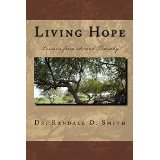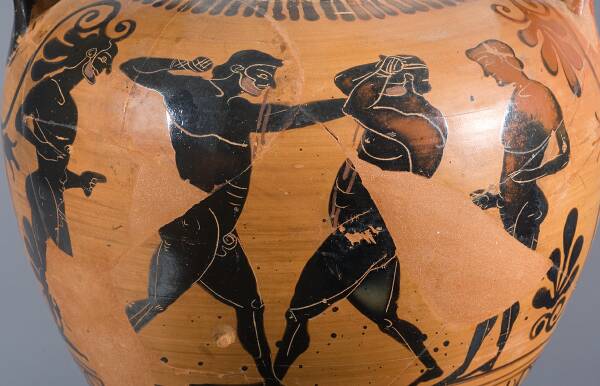 Carrie Fisher wrote a screenplay based on her own life in 1987 and by 1990 it was on the silver screen as a comedy movie called “Postcards from the Edge”. In the year that followed, the movie was acclaimed at the Academy awards… The story was about an actress who was a recovering drug addict and her attempts to re-start her career and her life after leaving the treatment center. She was forced to move in with a “responsible adult” in order to keep her insurance, and she returned to take residence with a famous musical comedy star of the 1950s and ’60s – her own mother. The title of the movie tells how “out of control” the scenes within the screenplay became – and I can only imagine on the big screen it was even more off the wall. I mention the screenplay because the title popped into my mind as soon as I began thinking through the letters to the Thessalonians…they were letters written from the edge of pain and during a season of recovery for Paul- and that often is forgotten in the teaching of the epistles to Thessalonica. Our next two lessons in the life of the Apostle will be about the substance of these letters.
Carrie Fisher wrote a screenplay based on her own life in 1987 and by 1990 it was on the silver screen as a comedy movie called “Postcards from the Edge”. In the year that followed, the movie was acclaimed at the Academy awards… The story was about an actress who was a recovering drug addict and her attempts to re-start her career and her life after leaving the treatment center. She was forced to move in with a “responsible adult” in order to keep her insurance, and she returned to take residence with a famous musical comedy star of the 1950s and ’60s – her own mother. The title of the movie tells how “out of control” the scenes within the screenplay became – and I can only imagine on the big screen it was even more off the wall. I mention the screenplay because the title popped into my mind as soon as I began thinking through the letters to the Thessalonians…they were letters written from the edge of pain and during a season of recovery for Paul- and that often is forgotten in the teaching of the epistles to Thessalonica. Our next two lessons in the life of the Apostle will be about the substance of these letters.
You will recall that in our last study we saw that Paul was passing through a difficult time on that second mission journey, in part because the trip began with an argument that broke the Paul and Barnabas team over the issue of John Mark. Next, they found themselves confounded on God’s direction for forward progress, being stopped from heading toward Bithynia. God redirected the team with a dream of the Macedonian man, but Paul had no sooner seen his first converts there in Philippi, when he and Silas were beaten and imprisoned. After a dramatic release by God’s intervention and then His providence, they passed through to Thessalonica – only to have Paul’s family member assaulted (Jason) and held until Paul left town. On to Berea, and Paul saw success until a rabble had HIM singled out to depart alone for Athens. His Athenian trip was “off script” for Paul’s normal venture, and as he continued to Corinth – he did so extremely discouraged and beaten down. It was during that short visit in Athens that Paul made the decision to dispatch Timothy to Thessalonica – delaying their reunion but offering Paul a window on the progress of the Gospel. As God helped Paul pick up the pieces he wrote the two letters to the Thessalonians help us grasp the mindset of Paul in recovery, and explore what was on his heart as God put him back together in Corinth. Paul showed that when wounded, a believer’s values surface without “make up”. People can see what we truly care about when we have no energy left to mask our broken heart.
Key Principle: A mature believer lives his values and follows under pressure, recognizing God is at work even when times are tough.
In these two lessons, we want to sweep quickly through the two letters Paul wrote and capture what was exposed of his heart by the letters. We know their context; now we need their content. The question we are seeking to answer is this: “What was exposed from the Apostle’s heart as it was torn open by pain and tribulation over the rejection of the Gospel?” Let’s focus on the First Epistle to the Thessalonians. The letter can be divided into two parts:
First, Paul opened the letter with six declarations that recapped the context of the writing:
Paul exposed some important things by sharing simple declarations. Let’s consider what we learn of him in each of the six:
1. Paul Hurt: Paul and his team was praying for the believers at Thessalonica constantly, thanking God for them, longing to return to them – but was hindered from going there (1:1-2; 2:17-20; 3:9-11).
Look at the phrases from 1 Thessalonians 1:2 “We give thanks to God always for all of you, making mention of you in our prayers.” Similar sentiments are expressed in 2:17 “But we, brethren, having been taken away from you for a short while—in person, not in spirit—were all the more eager with great desire to see your face. 18 For we wanted to come to you—I, Paul, more than once—and yet Satan hindered us.” Later in 3:9 we read: “For what thanks can we render to God for you in return for all the joy with which we rejoice before our God on your account, 10 as we night and day keep praying most earnestly that we may see your face, and may complete what is lacking in your faith?”
It is clear that when Paul’s heart was torn open, what spilled out was his love for those other believers. Mature Christians care for younger believers – not to sit in judgment over them – but to see them progress. They communicate care for younger followers of Jesus, because the heart of the missionary isn’t about self-affirmation but of love for lost men and women. That love doesn’t end when they follow Christ – it morphs into a deeper and more permanent hope for their growth and life ahead.
2. Paul Remembered: Paul saw God’s choice of them and their dramatic life changes by the power of the Spirit as they became followers of Jesus – the Gospel was obviously powerful among them (1:3-5; 2:13).
It is not difficult to see in places like 1 Thessalonians 1:3ff that Paul saw God at work in them. He wrote: “…5 for our gospel did not come to you in word only, but also in power and in the Holy Spirit and with full conviction; just as you know what kind of men we proved to be among you for your sake.” He affirmed that again in 2:13 “For this reason we also constantly thank God that when you received the word of God which you heard from us, you accepted it not as the word of men, but for what it really is, the word of God, which also performs its work in you who believe.”
How exciting to see God’s hand touch lives. One of the rich assurances we have as we look back on ministry where we have been fortunate enough to participate is those times when we saw God heal a broken marriage that we couldn’t fix with counsel. We stood amazed as God took a certain young man bent on self-destruction, and broke his life-hardened heart to lead him into his Creator’s arms. It is one thing to know from God’s Word that our God and His message is powerful – it is another to experience God on the move. When it happened, Paul was deeply thankful God gave him a place in the room to watch what God was doing! The Apostle knew that excitement. Even in the brokenness of rejection by many in his present place, his heart remembered God at work in the past – and that kept him going.
3. Paul Promised: Paul pledged that trouble would come, and it did quickly upon them as it had in his team’s lives. They were afflicted and walking with God under fire, becoming witnesses to the world as they suffered injustice (1:6-8; 2:1-2; 3:4).
Paul apparently never pulled his punches when he came to them initially. Perhaps preaching to people just after you have been beaten and jailed he figured, no sense trying to “pretty things up” – it was going to get tough quickly and he warned them. Note in 1 Thessalonians 1:6, he commended them when he wrote: ”You also became imitators of us and of the Lord, having received the word in much tribulation with the joy of the Holy Spirit, 7 so that you became an example to all the believers in Macedonia and in Achaia.” He made clear the troubles of the mission team again in 1 Thessalonians 2:1-2, and reminded them in 3:4 “For indeed when we were with you, we kept telling you in advance that we were going to suffer affliction; and so it came to pass, as you know.”
I am continually amazed at how modern marketing has affected the presentation of the Gospel. Paul delivered a message that offered suffering and persecution from the outset. Where was the “how to have a happy and meaningful life” section? Paul’s Gospel was about salvation from sin and a secure walk with God for eternity – not about a better bank account and other temporal perks. I recognize that our presentation needs to be culturally sensitive, but that cannot mean changing the substance of the truth because we want people to accept our message. I simply argue that when we change the message so drastically to grab our culture, what feed their self-focus, and betray the core of the message we were given to represent by God.
I personally think Paul marveled at how quickly they were “under the gun” in 1 Thessalonians 2:14 “For you, brethren, became imitators of the churches of God in Christ Jesus that are in Judea, for you also endured the same sufferings at the hands of your own countrymen, even as they did from the Jews, 15 who both killed the Lord Jesus and the prophets, and drove us out.” What makes us think that we should preach to people prosperity with the signs of the times we see all about us? Why do we not accept the coming troubles as PART of our faith – after a long line of others have passed through similar things? Paul promised troubles with their belief, whether that hindered people from coming forward in the meeting or not. At least when trouble came, he could remind them of that promise. Will our churches be able to make the same claim if we preach a message of personal advancement?
4. Paul Clarified: Lest anyone attempt to charge that Paul’s outreach was self-benefitting manipulation, Paul reminded them of how they offered truth in gentleness and love while working to be no burden to them (2:3-11).
Attacks on Paul’s preaching were evident from the start in the Book of Acts, and here Paul reinforced the content of some of those false charges. In 1 Thessalonians 2:3, Paul didn’t defend himself beyond making clear the truth. He wrote: “For our exhortation does not come from error or impurity or by way of deceit; 4 but just as we have been approved by God to be entrusted with the gospel, so we speak, not as pleasing men, but God who examines our hearts. 5 For we never came with flattering speech, as you know, nor with a pretext for greed—God is witness— 6 nor did we seek glory from men, either from you or from others, even though as apostles of Christ we might have asserted our authority. 7 But we proved to be gentle among you, as a nursing mother tenderly cares for her own children. … 11 just as you know how we were exhorting and encouraging and imploring each one of you as a father would his own children.”
Paul established in the short time he was in Thessalonica that he did not want to burden them with his expense, he was not a lazy man, and he did not work among them as some kind of ancient huckster or salesman. He worked hard, paid his way, and cared for them personally as he preached Biblically. The bottom line was this: He could call upon his TESTIMONY of life to back up his MESSAGE. Words are far more effective when they are rooted in a measured life that endeavors to live truth. If you are living in sexual sin, it is hard to correct a son or daughter who is about to make such a choice. They know you – and your life doesn’t match your lofty words. If you cheat on your taxes, it won’t be long until your voice cracks when you tell your teen not to cheat on their upcoming exam. Paul made clear that his life backed his message. He was not perfect, but he was no huckster, either. Words to the contrary may have been floating about – but Paul would have none of that left unanswered. We can be harmless in our response, but we need not flinch from clarifying attacks that are based on lies. If we represent truth, we must do so without apology – popular affirmation or not.
5. Paul Exhorted: From the beginning, the message was not only to come to Christ, but to be changed in their daily walk to a manner worthy of Jesus’ payment for them (2:12; 3:12-13).
He encouraged the believers to walk with God, not simply look at the Gospel as a “get out of Hell free” card. In 1 Thessalonians 2:12 he wrote: “…so that you would walk in a manner worthy of the God who calls you into His own kingdom and glory.” He affirmed that as a core value in 3:12 when he wrote: “…and may the Lord cause you to increase and abound in love for one another, and for all people, just as we also do for you; 13 so that He may establish your hearts without blame in holiness before our God and Father at the coming of our Lord Jesus with all His saints.”
We made the point that Paul promised trouble rather than fill his presentation with personal benefit, but it is worth remembering that Paul also demanded surrender to Jesus in areas of behavior rather than emphasizing only the benefits of Heaven and security in our eternal state. Paul connected the message of the Gospel and the foundation of the church to a call to HOLY LIVING. Is that message what we hear proclaimed about us today? Paul’s heart was exposed. He wanted believers to live like they were God’s people – not self-indulgent princes and princesses that allowed their “felt needs” to direct their decisions. This will be even clearer in the second part of his letter, so we will reserve the discussion until then.
6. Paul Celebrated: When Paul couldn’t wait to hear from the new believers and know of their progress in Christ any longer, he sent Timothy – who eventually returned with a joyful report (3:1-3, 5-8).
In the opening three chapters of the book, Paul communicated excitement over the people that he received from the report Timothy brought back to him. In 1 Thessalonians 3:1, Paul wrote: “Therefore when we could endure it no longer, we thought it best to be left behind at Athens alone, 2 and we sent Timothy, … 6 But now that Timothy has come to us from you, and has brought us good news of your faith and love, and that you always think kindly of us, longing to see us just as we also long to see you, 7 for this reason, brethren, in all our distress and affliction we were comforted about you through your faith; 8 for now we really live, if you stand firm in the Lord.”
Who can mistake Paul’s note of anxiousness concerning the people? He prayed and prayed, because like all of us, he was tempted to worry and worry. Paul was an Apostle, not a demi-god that wasn’t afflicted with a sin nature and a desire to control what he could not. Don’t make him such a good guy that you no longer see him as a regular Christian – struggling to trust God when things are falling apart. Remember what he had been suffering along the journey? Sometimes it seems God hides His control – when, in fact, what He is doing is working beyond our sight and in matters beyond our grasp. Paul heard back from Timothy, and celebration and joy flooded, tears flowed, and his prayer journal got some exclamation points scratched beside old requests!
The opening three chapters of the letter then, seem to offer a description the permeation of the Gospel to the Thessalonians during the three weeks of the mission team’s tireless sharing and caring ministry, another verified account of their forced exit from the believers under duress and a record of Timothy’s dispatched trip to check in. Apparently Paul agreed to have Timothy go while he was still alone in Athens during his darkest time of ministry. That left the Apostle without his team longer, but in the end it provided word from the fledgling church in Macedonia that so richly encouraged Paul. It’s nice to end the section on a note of happy celebration, but Paul’s letter had a second part as well.
Second, Paul wrote specific commands to the people to follow:
This section includes the last two chapters of the letter as the Epistle is divided for us in our modern Bibles. Paul made clear that the commands were a continuation of his earlier “live” teaching, and that he expected the people to continue to grow in obedience and submission to the teachings as from God. In classic fashion, Paul made that clear at the very beginning of the section, found in 1 Thessalonians 4:1 when he wrote: “Finally then, brethren, we request and exhort you in the Lord Jesus, that as you received from us instruction as to how you ought to walk and please God (just as you actually do walk), that you excel still more. 2 For you know what commandments we gave you by the authority of the Lord Jesus.”
Paul wasn’t unsure of what he taught, nor the source of the revealed truth – and he made that clear. A church that surrenders parts of their Bible in fear of looking un-scientific or a dread over charges of a text lacking historical integrity will also surrender moral precepts in the face of social pressure – it is inevitable. Paul asserted vigorously that his words were from God. If they weren’t, he was lying. If he was telling a lie (or some editor inserted this idea later) than the Bible is not a good book, but a book of lies. It won’t lead you to Heaven – if such a place exists. It cannot tell you about your Creator – if there is one. My point is that the surrender of the text is a BIG DEAL to our faith – because our faith is rooted completely within it. The earlier church used phrases like: “The Bible is our only rule for faith and practice.” In modern churches where that idea has been surrendered, it is but a matter of time when they lose all coherence and consistency in their practice, and become a lump of clay molded not by a Heavenly potter, but by earthly pressures to allow the mold its influence.
What were these essential commands to which the Apostle pointed them? Let me suggest the three that seem to “stick out” more than others:
First, there was the command to live a life of sexual purity (4:3-8).
1 Thessalonians 4:3 states: “For this is the will of God, your sanctification; that is, that you abstain from sexual immorality; 4 that each of you know how to possess his own vessel in sanctification and honor, 5 not in lustful passion, like the Gentiles who do not know God; 6 and that no man transgress and defraud his brother in the matter because the Lord is the avenger in all these things, just as we also told you before and solemnly warned you. 7 For God has not called us for the purpose of impurity, but in sanctification. 8 So, he who rejects this is not rejecting man but the God who gives His Holy Spirit to you.”
Paul flatly stated sexual purity as a core value of the early church, and a revealed truth from God above. He called us to “sanctification” a word that means “to be set apart”. Lest that not be clear, he followed with another restatement in verses four and five, that a believer is NOT to be like the world around them in this area. As he developed the thought, he told them in verse six that relationships between them were to be held as a high value, and that sensual behaviors would “defraud” others in the family of God. He made clear that God intended distinction in this area, and that rejecting the cause of purity was not an option as a believer.
Here again I find myself wondering if Paul would recognize the modern church as “Christian” in its value system.
Purity is encouraged when we carefully delineate how attraction is not the same as action. God placed desires within us – we were created with some intrinsic desires. At the same time, we live in a fallen state. As a result, we must be very careful not to see those desires as something “naturally good”. Man is broken inside, and his desires reflect that brokenness. We must continually make clear a Biblical truth – wanting something is not the same as acting on a desire. The Bible begins with simple restriction of action – but eventually calls the maturing believer to surrender the very desires themselves. When we “grow up” in our faith, we won’t excuse our sin by claiming desire had the determining place in our decision making process. We will see God’s will, not our want, as the most important factor.
Purity is encouraged when we help young women understand the value of developing their inner spirit as well as keeping a healthy body. With a fashion world designed to pry money from your wallet and promising to make you look “hot” – it has become even more important for the church to carefully help young women to see that the body will not retain its God-given youthful beauty forever. We get older or we die on the path. The fact is, we are on the planet for a short time compared to eternity. If the Christian message is true, our submission to Jesus is based on two things: first we acknowledge that Jesus is our Lord and we offer Him our whole self. Second, we submit because we know that our Savior knows what is best. He knows what we do not about the plan, the future and our best life in His presence in eternity. Purity is encouraged when we teach men and women to see eternal things as more important than temporal ones.
Purity is encouraged when we place safeguards on our young men at home and restrict their unlimited access to websites and media that encourage immoral sexual pursuits. Because we have redefined the word “adult” in the context of sexuality as “removal of restraint” in our society, the church must clearly mark out that ADULT truly means “under control”. It is a CHILD that throws a tantrum when unhappy. An adult should know better. We must apply that same logic to other urges. Children punch and punch back. Adults should have better control of their hands. We must make the case that guardrails and restrictions aren’t to stop young people from growing – they are to provide sufficient time for that young person to grow the necessary disciplines before thrown to predators that lurk across the wireless signals.
After commanding purity, a second command was offered – to work hard and stay out of other people’s business (4:9-12).
1 Thessalonians 4:9 Now as to the love of the brethren, you have no need for anyone to write to you… 10 …But we urge you, brethren, to excel still more, 11 and to make it your ambition to lead a quiet life and attend to your own business and work with your hands, just as we commanded you, 12 so that you will behave properly toward outsiders and not be in any need.
It may astound modern Christians to know that Paul intended believers to get a job, work in that job and avoid making other people pay their way. In fact, the Apostle made the point that a believer’s ability to take care of others and live quietly at work was very much a part of their Christian faith. We need not meddle from the pulpit, we have Scripture before us that challenges any who would see a way around work as God’s plan. There are disabilities that need to be taken into account – but I suggest this is an extreme much less frequent than claimed – even by believers. We cannot enshrine laziness in some kind of reward system and expect anything less than an increasing number of unproductive people. When there is a true need, a believer is not wrong to access the provision for that need – but we must be very wary here of expecting others to pay our way through life. Some people are simply unsure of a truth: Life is hard. Work is not always fun. Since the expulsion from the garden every job was given its weeds. We must be careful to check any thinking that would argue that everyone has is easier than we do. In many, if not most cases, some of our difficulty was added by our own earlier life choices.
After purity and focused work, there was a third command – to comfort one another with the truth concerning death and life (4:13-5:11).
It seems from reading 1 Thessalonians 4:13-15 that some believers felt those who died in Christ were somehow penalized – a notion the Apostle quickly dismissed in the letter. Paul wanted to make sure the “uninformed” were made to understand that those believers who died actually have a better place in line of the resurrection of the dead. The timing of that resurrection are as follows:
1 Thessalonians 4:16 “For the Lord Himself will descend from heaven with a [m]shout, with the voice of the archangel and with the trumpet of God, and the dead in Christ will rise first. 17 Then we who are alive and remain will be caught up together with them in the clouds to meet the Lord in the air, and so we shall always be with the Lord. 18 Therefore comfort one another with these words.
Paul wanted to make it clear that when Jesus returned to the earth to take His own, He would do so in the order of those who died BEFORE those who are alive. To the believer, death is no penalty, but a mere illustration that the fallen world has not yet been fully redeemed. When Christ makes all things new, death will be forever banished to the hole of the fiery pit. The rest of the section in 1 Thessalonians 5:1-11 reminded the believers that the world would not believe that Jesus would return, but would focus all their attention on THIS world. Beleivers should be awake and alert in their times, and comforting one another with the truth that (as Martin Luther long ago wrote): “the body they may kill, God’s truth abideth still – His kingdom is forever!”
Missions Instructor Gregory Fisher of Victory Bible College wrote of his earlier times in West Africa: “What will he say when he shouts?” The question took me by surprise. I had already found that West African Bible College students can ask some of the most penetrating questions about minute details of Scripture. “Reverend, I Thess. 4:16 says that Christ will descend from heaven with a loud command. I would like to know what that command will be.” I wanted to leave the question unanswered, to tell him that we must not go past what Scripture has revealed, but my mind wandered to an encounter I had earlier in the day with a refugee from the Liberian civil war. The man, a high school principal, told me how he was apprehended by a two-man death squad. After several hours of terror, as the men described how they would torture and kill him, he narrowly escaped. After hiding in the bush for two days, he was able to find his family and escape to a neighboring country. The escape cost him dearly: two of his children lost their lives. The stark cruelty unleashed on an unsuspecting, undeserving population had touched me deeply. I also saw flashbacks of the beggars that I pass each morning on my way to the office. Every day I see how poverty destroys dignity, robs men of the best of what it means to be human, and sometimes substitutes the worst of what it means to be an animal. I am haunted by the vacant eyes of people who have lost all hope. “Reverend, you have not given me an answer. What will he say?” The question hadn’t gone away. “Enough’” I said. “He will shout, ’Enough’ when he returns.” A look of surprise opened the face of the student. “What do you mean, ’Enough’?” “Enough suffering. Enough starvation. Enough terror. Enough death. Enough indignity. Enough lives trapped in hopelessness. Enough sickness and disease. Enough time. Enough”.
I don’t know if the missionary is correct about that, but I wouldn’t be surprised! Life here is broken, but God is working a plan – and Paul showed that plan to be at work in him as he shared a short “Postcard from the edge” with the Thessalonians. He was hurt, but he was healing. He was beaten up, but he was not quitting. A mature believer lives his values and follows under pressure, recognizing God is at work even when times are tough.


 The qualifying mark of a real prophetic voice may be a broken heart – because in our weakness our Father can speak more powerfully through us.
The qualifying mark of a real prophetic voice may be a broken heart – because in our weakness our Father can speak more powerfully through us.















